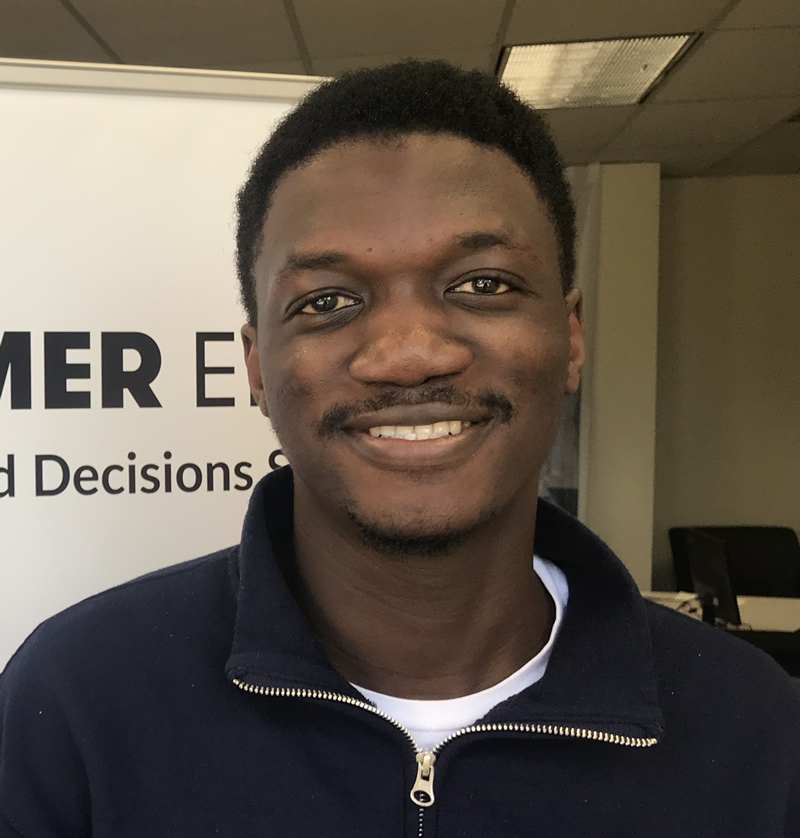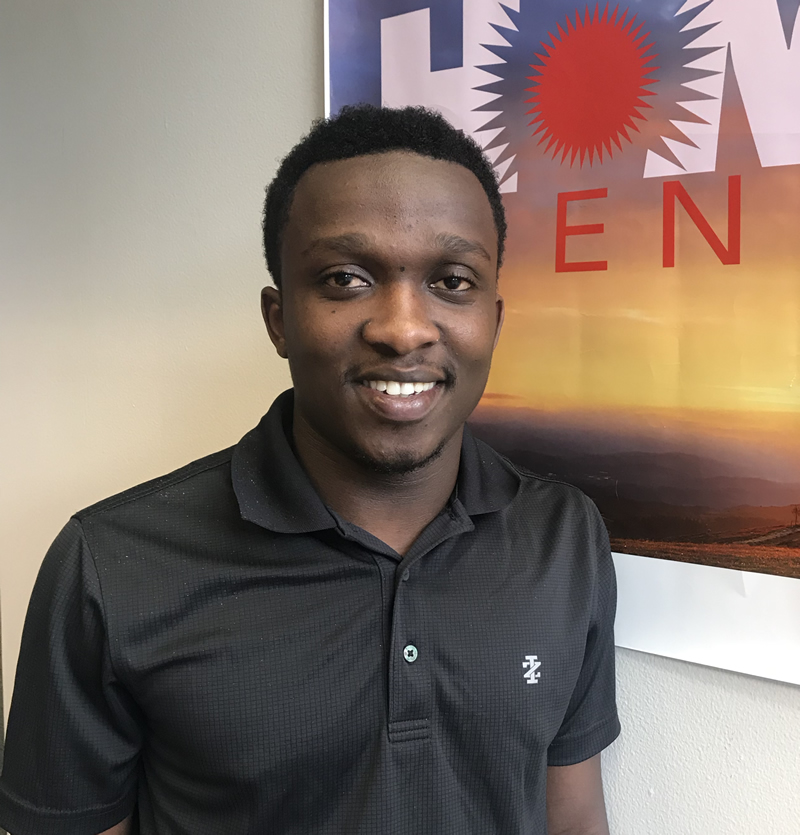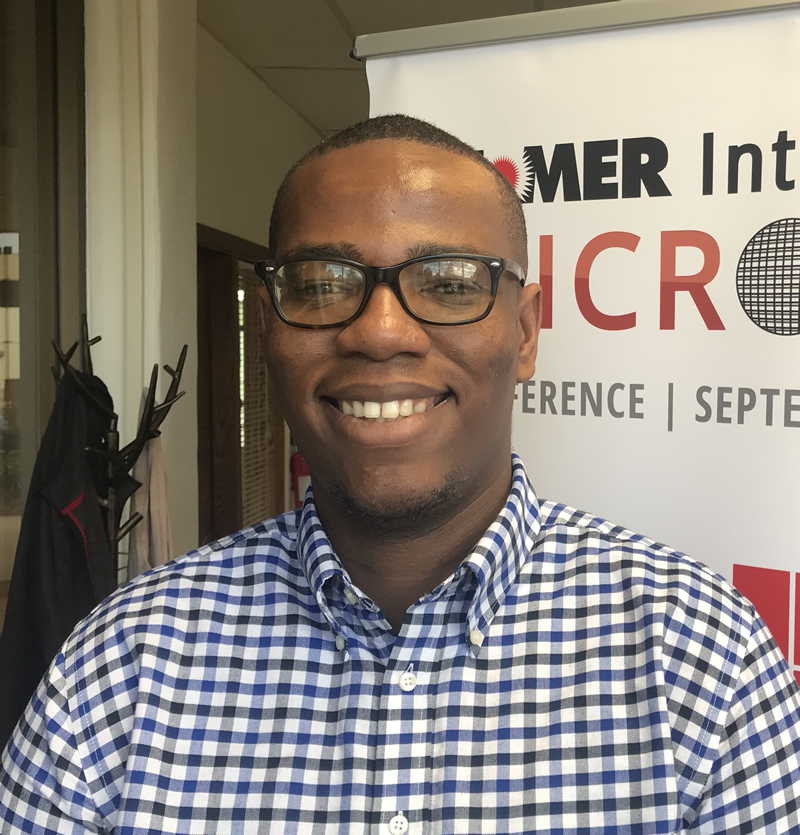HOMER Energy is delighted to welcome several interns from electrical engineering and computer science departments at the University of Notre Dame this summer. Musodiq Ogunlowo from Lagos, Nigeria, Perfect Mfashijwenimana from Musanze, Rwanda and Henri Francois from Port au Prince Haiti, are all about to enter their senior year of studies at Notre Dame. They have already been working hard to solve challenging engineering problems focused on modeling hybrid renewable energy systems and creating distributed energy generation resources, so they are fitting right in here at HOMER Energy.
We spoke to them about how they came to study energy systems and what career plans they have after graduation.
Musodiq Ogunlowo: Lagos, Nigeria

Musodiq Ogunlowo,“Tolu,” remembers acutely what it was like to grow up in Lagos with intermittent power supplies and diesel generators rumbling in the streets. He said he thought running out of power was “normal” until he left Nigeria. Tolu’s earliest childhood memories are of tinkering and experimenting. “I had a keen interest in electronics,” he remembers, “and was always taking things apart and trying to figure out how to put them back together.”
Eventually he was accepted at the African Leadership Academy in South Africa, which sends its graduates to some of the best universities around the world (William Kamkwamba, of “The Boy Who Harnessed the Wind” is another energy tinkerer who graduated from the African Leadership Academy.)
When he arrived at Notre Dame, Tolu says it seemed that most electrical engineers were focused on fields like computers and robotics. Energy didn’t seem to be that high on the agenda. But then he met Dr. Abigail Mechtenberg, a physics professor who was keenly involved in energy research in Ghana and Uganda. Dr. Mechtenberg encouraged Tolu to follow his instincts and study power systems. Now he says he looks forward to an exciting market for his skills in Africa and other developing countries.
After university studies, a renewable energy developer
“I think I can have a lot of impact working in the energy industry,” says Tolu. He wants to promote the local design and development of renewable energy systems and work to get more distributed energy in place in Nigeria. “The centralized grid is not working well,” Tolu notes. He points out that in Nigeria, most of the generation is in the south, where the country’s oil and natural gas resources lie, and then power is transferred to the north over transmission lines that are inadequate. Tolu believes there is a lot of potential for distributed renewable energy, particularly in the northern part of the country.
Tolu has seen a lot of small renewable energy project failures, mostly due to poor maintenance. He believes firmly that, “There has to be some kind of ownership that people can tap into. When people feel that something belongs to them they will work harder to sustain it.”
Microgrid development in Nigeria
Tolu is focusing his current research on building robust renewable energy systems that can power health clinics. He believes that opportunities are limitless in terms of social and economic improvements that can be made with local, distributed energy. “We can use optimization software (such as HOMER Pro),” he says, “to better understand how to integrate the systems that are built, and get them to perform to the requirements of the people who will use them.”
Tolu plans to work in the US for a while and head back to Nigeria when he’s equipped with enough skills to find his ideal job: working with renewable energy power providers and eventually building his own sustainable business that can provide affordable and reliable electricity for Nigerian communities.
Perfect Mfashijwenimana, Musanze, Rwanda

Perfect Mfashijwenimana grew up in Musanze, Rwanda, a mountain town famous for its populations of wild gorillas and a magnet for tourists. He also grew up with an awareness of power outages and unreliable electricity. As a young boy, Perfect went to seminary school and was destined to become a priest. But then in high school, he excelled in physics and math, and that changed his thinking. Ultimately, Perfect was accepted into a prestigious gap year program at Bridge2Rwanda, a school created to groom African students for important leadership positions.
At first Perfect thought he might go into civil engineering, and focus his effort on designing affordable housing, something he and his neighbors did not have while he was growing up. But then he remembers how his thinking shifted to focus on electrical power systems. “Housing impacts people directly,” says Perfect, “but you’re not giving them a tool to make money. Seventy percent of the people in Rwanda don’t have access to electricity yet, so enabling people with energy infrastructure gives them more economic potential than a single house,” he says.
Perfect remembers with crystal clarity how he was moved by a speech given by Rwandan President Paul Kagame at his graduation ceremony. Kagame said, “When much is given to you, much is expected of you.” Perfect has taken that challenge to heart. He says, “I asked myself what that means, and I decided it means I should help Rwanda prosper by making it possible for people to pursue their economic dreams. To me that means being able to work at night, do surgery – at night if necessary,” being able to create businesses where electricity can power large machinery. These things are still not possible in most parts of Rwanda. “All of this requires reliable electrical power, and that is what drives our economy,” says Perfect.
Eventually Perfect began his studies at Notre Dame, and like Tolu, soon discovered Professor Mechtenberg. Now he is zeroing in on trying to learn everything he can about electric power systems, the grid and renewable generation.
In the meantime, Perfect has already started pursuing entrepreneurial energy ventures back in Rwanda. He has built a team called Empowering Motherland (EMMO). Africa is often referred to as the motherland because it’s believed by archeologists to be the birthplace of humanity. Perfect says the team has designed a number of mechanical-to-electrical systems such as bicycle powered electricity generators, small wind turbines and most lately, low head hydro systems, to take advantage of Rwanda’s mountainous landscape and lush rainfall.
Aiming to build renewable energy businesses in Rwanda
Ultimately, Perfect wants to build independent renewable power projects that can be connected to the grid, and he says that despite the young ages of people on his team, the government has already contacted them to ask for ideas and business models that can point the way to more distributed renewable capacity.
Perfect says he’s thrilled to be able to connect his academic work to important projects like microgrid design, and gain access to a worldwide network of experts in distributed energy design. In short, he’s excited to learn how the real world of energy development works. Specifically he’ll be working on predictive control systems, understanding how different factors affect the performance of electrical systems and might affect those predictions.
Henri Francois, Haiti

Henri Francois is a computer science student from Port au Prince, Haiti. He too has memories of growing up with unreliable electricity. His parents had batteries and inverters to be sure there was always power in their house, but sometimes that failed. In a worst case scenario, power in their neighborhood in Haiti’s capital could be down for as long as three weeks. Even in the best case, electricity would be unavailable for eight hours a day. Francois says there is a huge problem with energy theft in Haiti, which has led to a discouraging debt spiral for Haiti’s national utility, and no one seems able to fix the problem. As a result, the utility and its customers are stuck with a fleet of aging diesel generators powered by fuel that is very expensive to ship to the island. Added to that, the power is distributed over the crumbling infrastructure of an electric grid that has no resources for repairs or upgrades.
Henri went to one of Haiti’s oldest and most well-established high schools, St. Louis de Gonzague. Inspired by a computer programming boot camp, he first thought of going into computer science. But then he heard of the diverse projects that were underway in Professor Mechtenberg’s laboratory. He believed they were socially important, and he became intrigued about the multidisciplinary potential of computer science and energy. Ultimately Henri decided to apply to Notre Dame and was accepted. Now he says he’s still a computer science student, but he’s focused on energy. Bridging the gap to energy engineering he says, is the hardest thing he’s ever done. “Sometimes it’s hard to understand the way electrical engineers think about things and I have to adapt. But eventually we begin to understand each other.”
Now, like Tolo and Perfect, Henri is working on multiple entrepreneurial projects back in his home country. Under the auspices of Notre Dame Energy, Henri works in the special E3 program (Education, Engineering, Entrepreneurship), which is part of the Energy and Sustainable Development with Design laboratory. He gets funding to develop projects in Haiti, including microgrids for the city of Hinch, where he has a small team working to understand the tradeoffs between low head hydro, biomass and wind. In two other locations, Henri says he’s teaming up with local people to work on similar projects, and also experimenting with a variety of small mechanical-to-energy devices and calculating how much energy can be generated from them. One of the principles of the E3 programs, he says, is to use local resources for energy generation, foregoing expensive imports such as solar PV, and learning how communities adapt to taking responsibility for their own energy production.
In all of these projects, the E3 students are studying how each microgrid performs, and how the different inputs alter the ways in which the resources are controlled and dispatched. Henri says, “it’s a really small scale now, but we are being taught to grow the system as we learn more. We have to move step by step.”
Henri Francois: Combining software engineering and energy entrepreneurship
Henri Francois says this is just the right time for a student to be combining computer science and power electronics. There is an explosion of interest in digital controls for energy systems and information technology is the enabler for many of the most interesting innovations in distributed energy. Henri says, “In the short term, I’d like to get into software engineering – maybe go to grad school. I want to understand how to write software that people will want to use. Ultimately, I know I want to work in Haiti despite the political turmoil. I’m thinking more and more about becoming an entrepreneur and going into the energy business back home.”
